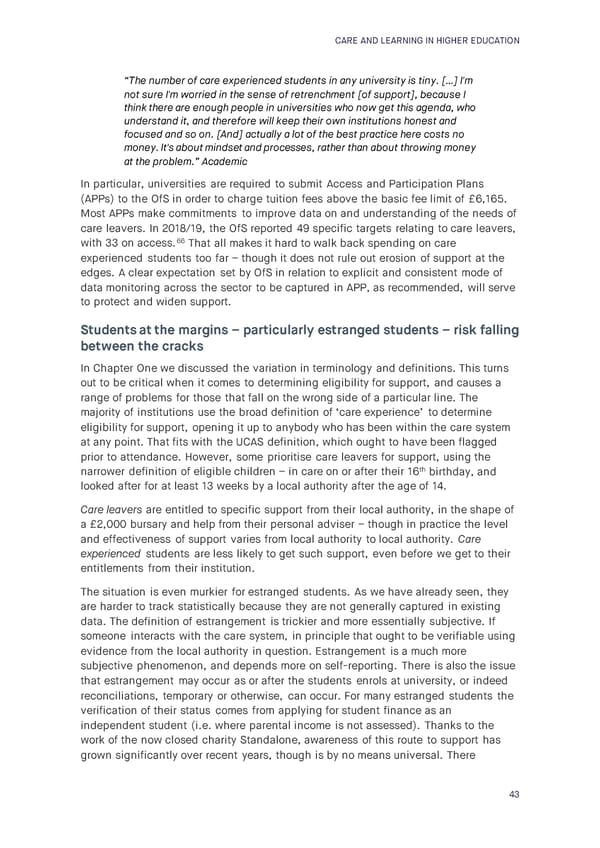CARE AND LEARNING IN HIGHER EDUCATION “The number of care experienced students in any university is tiny. […] I'm not sure I'm worried in the sense of retrenchment [of support], because I think there are enough people in universities who now get this agenda, who understand it, and therefore will keep their own institutions honest and focused and so on. [And] actually a lot of the best practice here costs no money. It's about mindset and processes, rather than about throwing money at the problem.” Academic In particular, universities are required to submit Access and Participation Plans (APPs) to the OfS in order to charge tuition fees above the basic fee limit of £6,165. Most APPs make commitments to improve data on and understanding of the needs of care leavers. In 2018/19, the OfS reported 49 specific targets relating to care leavers, with 33 on access.66 That all makes it hard to walk back spending on care experienced students too far – though it does not rule out erosion of support at the edges. A clear expectation set by OfS in relation to explicit and consistent mode of data monitoring across the sector to be captured in APP, as recommended, will serve to protect and widen support. Students at the margins – particularly estranged students – risk falling between the cracks In Chapter One we discussed the variation in terminology and definitions. This turns out to be critical when it comes to determining eligibility for support, and causes a range of problems for those that fall on the wrong side of a particular line. The majority of institutions use the broad definition of ‘care experience’ to determine eligibility for support, opening it up to anybody who has been within the care system at any point. That fits with the UCAS definition, which ought to have been flagged prior to attendance. However, some prioritise care leavers for support, using the th narrower definition of eligible children – in care on or after their 16 birthday, and looked after for at least 13 weeks by a local authority after the age of 14. Care leavers are entitled to specific support from their local authority, in the shape of a £2,000 bursary and help from their personal adviser – though in practice the level and effectiveness of support varies from local authority to local authority. Care experienced students are less likely to get such support, even before we get to their entitlements from their institution. The situation is even murkier for estranged students. As we have already seen, they are harder to track statistically because they are not generally captured in existing data. The definition of estrangement is trickier and more essentially subjective. If someone interacts with the care system, in principle that ought to be verifiable using evidence from the local authority in question. Estrangement is a much more subjective phenomenon, and depends more on self-reporting. There is also the issue that estrangement may occur as or after the students enrols at university, or indeed reconciliations, temporary or otherwise, can occur. For many estranged students the verification of their status comes from applying for student finance as an independent student (i.e. where parental income is not assessed). Thanks to the work of the now closed charity Standalone, awareness of this route to support has grown significantly over recent years, though is by no means universal. There 43
 Care and Learning in Higher Education Page 43 Page 45
Care and Learning in Higher Education Page 43 Page 45